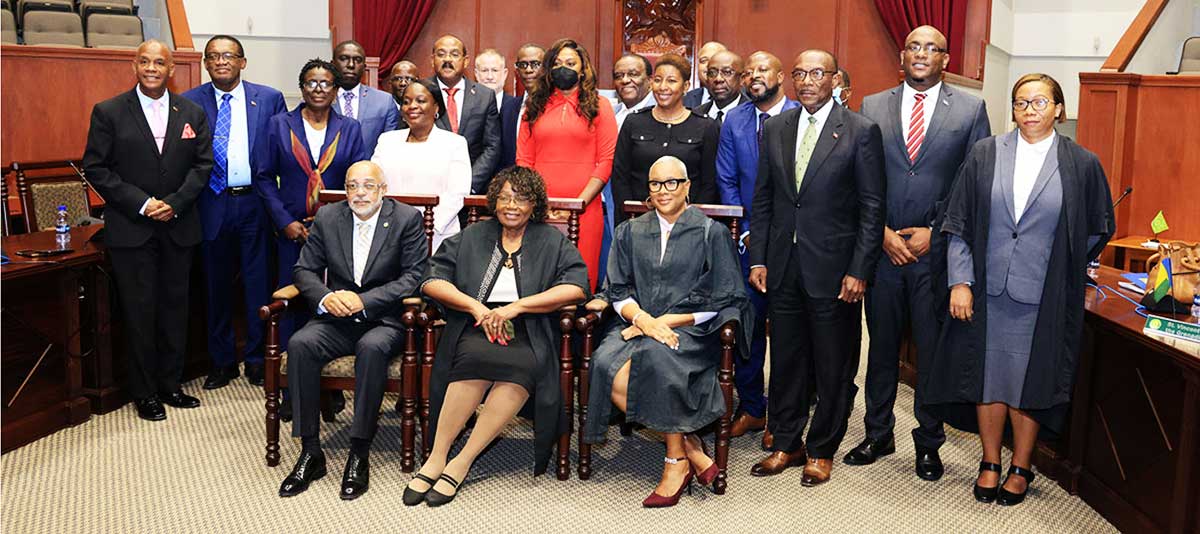
The Organisation of Eastern Caribbean States (OECS) concluded its 6th sitting of the OECS Assembly on March 18, 2022, at the House of Parliament in Antigua and Barbuda. In attendance were elected representatives from both Government and Opposition parties in Member States.
At this year’s sitting, the primary matter for consideration was environmental sustainability, with a focus on climate change, under the theme: The SHIFT: Embracing New Platforms and Innovative Models for Leadership in Sustainability.
At the commencement of the meeting, Chairman of the OECS Authority and Prime Minister of Grenada, the Right Honourable Dr. Ketih Mitchell, addressed the gathering virtually. He reminded the gathering of the necessity of this regional organ, considering recent global events and commended the strides made to deal with recent crises, particularly the COVID-19 pandemic. He stated, “Our circumstances and unique vulnerabilities as Small Island Developing States (SIDS) demand particular attention and creativity, as we continue to navigate and strive amidst an ever-present and emerging crisis and developmental challenges.”
Following the Chairman’s address, Prime Minister of Antigua and Barbuda, the Honourable Gaston Browne, welcomed members of the Assembly and underscored the importance of this sitting, as Regional leaders sought to address the vulnerability of Caribbean islands to the effects of climate change. In his discourse, he stated:
“The two monsters staring down Caribbean governments are debt and vulnerability. We have to arm ourselves with the weapons that can slay these two monsters. The Economic Commission for Latin America and the Caribbean (ECLAC), has determined that the dangerous debt position of Caribbean governments has not risen from policy mistakes, fiscal irresponsibility, or the international financial crisis. Rather, the debt position of our countries has come about because of structural weaknesses and vulnerabilities, especially vulnerabilities to external shocks because of these extreme weather events.”
Four international guest speakers addressed the Assembly, namely, the Right Honourable Lord Goldsmith, Minister of State for the Pacific and the International Environment in the UK Government, Mr. David Baron, co-founder of the International Conservation Caucus Foundation (ICCF) Group, Honourable Simon Kofee, Minister of Justice, Communication and Foreign Affairs in Tuvalu, and Honourable Sameh Shoukry, Foreign Affairs Minister of Egypt and President-Designate of the upcoming COP 27.
Honourable Shoukry reminded the gathering of the painful reality that “vulnerable small island developing states in Africa, the Caribbean, and the Pacific communities are already witnessing the unprecedented impacts and risks of freshwater stress, coral bleaching, increased disease vectors, and aridity among others. Adaptation and resilience limits have already been reached in various places across the globe, and more will emerge as temperatures rise especially if 1 1/2 degrees of global warming is exceeded.”
Honourable Simon Kofee, highlighted the shared vulnerabilities between the Caribbean and Pacific Islands.
“As countries in the Pacific and the Caribbean, we must take heed of what science and nature are saying. There is no better time than now to embrace new platforms to address climate change. We must take action today to develop strategies to maintain our sovereignty and strengthen our macroeconomic resilience to cushion the impacts of climate change on our people and land,” Kofee said.
Lord Goldsmith in his address reiterated the UK’s commitment to working with the OECS, as it faces monumental challenges related to climate change.
“The focus of this assembly is another immense global challenge, and I’m delighted that we’re working together to make sure people across the Eastern Caribbean can feel the benefits of accelerating the shift towards a net-zero, nature positive future that is now underway, from rolling out solar to capture the sunshine that draws tourists to your islands, and making the transition towards zero-emissions vehicles, to helping hospitals provide care during natural disasters,” said Honourable Lord Goldsmith.
The ICCF cofounder, Mr. David Baron, gave a brief history of the Caucus and its work globally. He concluded his address with this appeal:
“So here we are at your disposal if you will use us. We will work on the things that you want us to work on, but what we are most interested in is supporting those things where it would benefit your regional collaboration, but also your global collaboration where we can help, and this includes, by the way, facilitating relationships with institutions that could help fund projects.”
The Members of the Assembly debated a Motion, titled after the theme for the Sitting, and unanimously endorsed the designation of the assembly as a regional ICCF caucus for advocacy engagement in the OECS.
This Assembly sitting was supported by the European Union (EU) and the International Caucus Foundation (ICCF) group. The EU is currently financing the BioSPACE Project – which seeks to conserve marine biodiversity – and the ILM project, which seeks to conserve terrestrial biodiversity. Both projects are being executed in nine OECS Member States. The ICCF Group recently signed a Memorandum of Understanding with the OECS at COP26 in Glasgow Scotland to collaborate towards building political will for environmental conservation in the Eastern Caribbean.
This Regional Meeting in pursuit of environmental sustainability was significant in light of the OECS’ current Strategic Objectives, which include, “Value the Environment” and “Building Resilience.” The Organisation continues to chart a future with environmental sustainability at the core and remains committed to securing a sustainable future for succeeding generations.





![Attendees at the UHC logo and website launch [Photo credit: GOSL]](https://thevoiceslu.com/wp-content/uploads/2026/02/Attendees-at-the-UHC-logo-and-website-launch-380x250.jpg)






![Remnants of an alleged drug boat blown up in a lethal strike by the U.S. military last week surfaced off Canouan on Saturday [Photo credit : St Vincent Times]](https://thevoiceslu.com/wp-content/uploads/2026/02/Remnants-of-an-alleged-drug-boat-blown-up-380x250.jpg)
